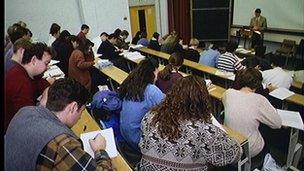University personal statements 'further disadvantage' poor
- Published
- comments

Only 10% of first-year degree students are from low-income areas
State school pupils are often disadvantaged by the university application process in the UK, a report by an educational charity says.
The Sutton Trust says pupils from independent schools are more likely to shine in their "personal statements".
It says their applications are generally better written and list more prestigious, relevant activities than those of state-school pupils.
Many schools, private and state, offer pupils help with their statements.
And some companies offer to write them for money.
The statement is an essay applicants write about themselves that is meant to persuade universities or colleges they are right for a course.
The Sutton Trust's research, external, by Steven Jones of Manchester University, was based on a study of personal statements of 300 pupils with identical grades applying to the same department at "a leading university".
The charity said independent school applicants were more likely to have well-written statements, with fewer grammatical errors, "filled with high-status and relevant activities".
Dr Steve Jones, report author: "System needs to be reformed to better serve those [poorer] students"
"State school applicants, by contrast, appear to receive less help composing their statement and often struggle to draw on suitable work and life experience," it said.
'Managing a gastro pub'
The report highlights one application from an 18-year-old, who lists their work experience as working "for a designer in London; as a model; on the trading floor of a London broker's firm; with my local BBC radio station; events planning with a corporate five-star country hotel; in the marketing team of a leading City law firm… and most recently managing a small gastro pub".
The charity said for state school applicants, "work-related activity is more likely to involve a Saturday job or a school visit to a business".
And it contrasted that personal statement with this one from a state school pupil: "In Year 11 we were taken on a school trip to Cadbury World to analyse the aspects of the business. During the day we were given a presentation by the workers at Cadbury World who explained how they advertise, produce and promote their new and existing products. I felt this was particularly valuable to my understanding of the business world."
"In the final GCSE year there was an opportunity for a group of us to manage the school lockers."
The charity argues that the personal statement system "further disadvantages" teenagers from low- and middle income homes.
It says it could be made fairer if there was a limit on the number of activities people could list and if there was more of a focus on what applicants might contribute to university life.
It also recommended that more schools and colleges helped pupils with their university applications and that more professions offered work placements to young people from middle- and low-income families.
Sutton Trust chairman Sir Peter Lampl said: "This research suggests that the personal statement further disadvantages [applicants] from low- and middle-income backgrounds. Good state schools and colleges already help their most able students apply for places in leading universities. This should become the norm."
"But admissions processes also need to change. Personal statements should be more than an excuse to highlight past advantages."
Tips
Universities say the personal statement is "only one factor" taken in to account when offering places.
Nicola Dandridge, chief executive of Universities UK, said: "The report does raise the important issue of how school type, background and access to professional networks can influence the experiences of young people.
"However, university admissions staff are highly experienced at recognising this and taking such things into account when interpreting personal statements."
Prof Mary Beard, the Cambridge classicist and television presenter, tweeted: "Does Sutton Trust report really think I'm taken in by slick expensive personal statements on Ucas forms? We're not that easy to con."
She wrote about the statements in an article for the BBC News Website last year .
Report author Steven Jones found that although the students in the study all had the same A-level grades, 70% of those who were from independent schools went on to "a leading university" but just 50% of applicants from comprehensives and sixth-form colleges did so.
The body that manages university admissions, Ucas, gives tips , externalon writing personal statements and warns students applications are checked for plagiarism.
One teacher from a grammar school who contacted the BBC News website said he spent some time looking at "appallingly badly written personal statements with stupefyingly banal references to jobs in fish and chip shops or restaurants".
He said at his school, sixth form teachers looked at pupils' personal statements in their "breaks and rare free periods", while he knew of private schools where senior members of staff were taken off the time table "to do nothing else" but help students polish up their forms.
- Published18 October 2012
- Published18 October 2012
- Published18 October 2012
- Published18 October 2012